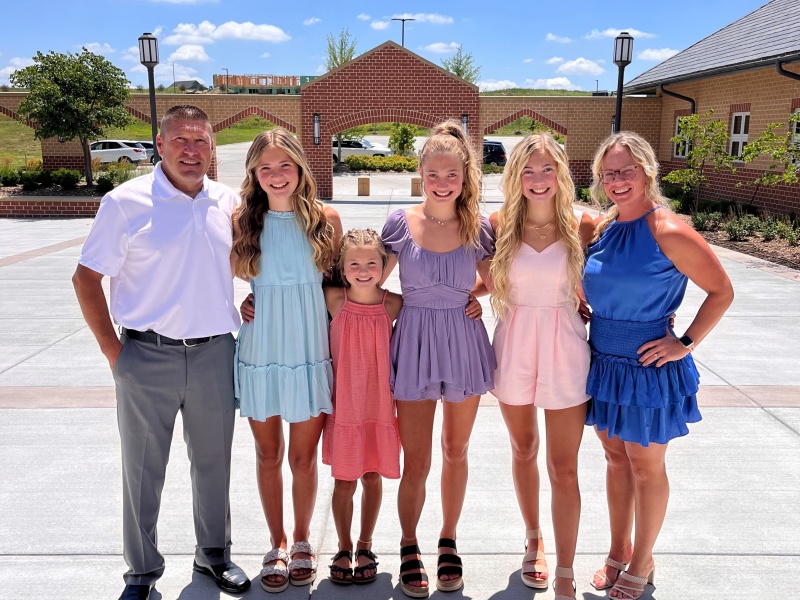
After spending time working around her acreage in late June 2022, Tiffani Zeleny says she woke up in the middle of the night with what felt like an itchy left eye.
Over the next few days, she says the eye became even more painful and sensitive to light. When Zeleny, of Gretna, Neb., visited her doctor, she was told she had an ulcer in her eye, put on medication, and told it would be better by the end of the weekend.
When the eye did not improve, Zeleny was referred to an ophthalmologist in Omaha, who diagnosed her with acanthamoeba keratitis, a parasitic infection of the cornea. According to the Centers for Disease Control, contact lens wearers, like Zeleny, who are exposed to any type of water source are at the highest risk for developing the condition.
“My life went downhill for a long time,” Zeleny says. “It was the most painful, irritating thing I’ve ever experienced. I couldn’t even open my eyes.”
Zeleny isn’t sure how she got acanthamoeba keratitis but says she didn’t take her contact lenses out when she showered.
Referral to Iowa City
Zeleny was prescribed eye drops, which she says were so toxic they “just kind of eat your eye. And I had to do them every hour.”
The eye continued to get worse, and Zeleny said by mid-August 2022, the ophthalmologist in Omaha said there was nothing else he could do. That’s when he referred her to Mark Greiner, MD, at University of Iowa Hospitals & Clinics in Iowa City, who is medical director for Iowa Lions Eye Bank.
“She was very distraught and understandably so,” says Greiner, who typically sees about 10 to 12 cases of acanthamoeba keratitis a year. “We had to get her on a really aggressive treatment regimen.”
Greiner warned Zeleny he may not be able to save her eye.
“It’s such a harrowing organism to treat that I tell all patients I don’t know which way it will go, and how resistant the infection is going to be,” Greiner says.
Getting rid of the acanthamoeba required 2 ½ hour-long infusions every day through a peripherally inserted central catheter (PICC) line at a hospital near Zeleny’s home in Omaha.
“I put patients on such infusions when drops are failing to contain the infection and surgery is needed to treat the infection,” Greiner says.
Greiner also was treating Zeleny for a concurrent fungal infection.
“I was on eight different eye drops at any given time, some I had to use every hour, some I had to use every two hours, some four times a day, and it felt like acid being poured into my eye every time,” Zeleny says. “I was so sick. I had already lost 20 pounds because of all the oral medications and eye drops and the pain.”
The road to a transplant
Before Greiner could even attempt a cornea transplant, the infection had to heal.
“I was locked in a dark room for 5 ½ months,” Zeleny says. “I have four daughters, ages 17, 15, 13 and 10, so they would help take care of me, and I just tried to stay super positive for them. I’m a very active person and I didn’t want them to be scared, but they obviously had never seen their mom lay on the couch in a dark room like that. My daughters are amazing, and they helped me get through this.”
Greiner says he usually would prefer to wait to do sight restoring surgery once an infection is gone and the eye is “quiet.”
“But in Tiffani’s case we had to go to surgery because the infection was worsening despite maximum tolerated medical therapy,” Greiner says.
Finally, on October 31, more than four months after she had first noticed a problem, Zeleny was ready for a cornea transplant in Iowa City, using tissue recovered, evaluated, and processed by Iowa Lions Eye Bank.
Greiner says Zeleny had a great outcome.
“I have seen worse,” he says. “I would say she had a severe case. She’s not even six months out from the transplant yet and she’s doing quite well.”
Greiner says he told Zeleny that no one would ever know her history by looking at her cornea now, because she has a totally clear cornea.
“I tell Dr. Greiner he saved my life, and he says ‘no, I saved your eye,’” Zeleny says. “But he truly saved my life. I had no life when I was sick. I’m so thankful. If you had told me 8 months ago that a cornea could be life changing for someone, I would have laughed. But it is life changing. I’m forever grateful to my donor.”